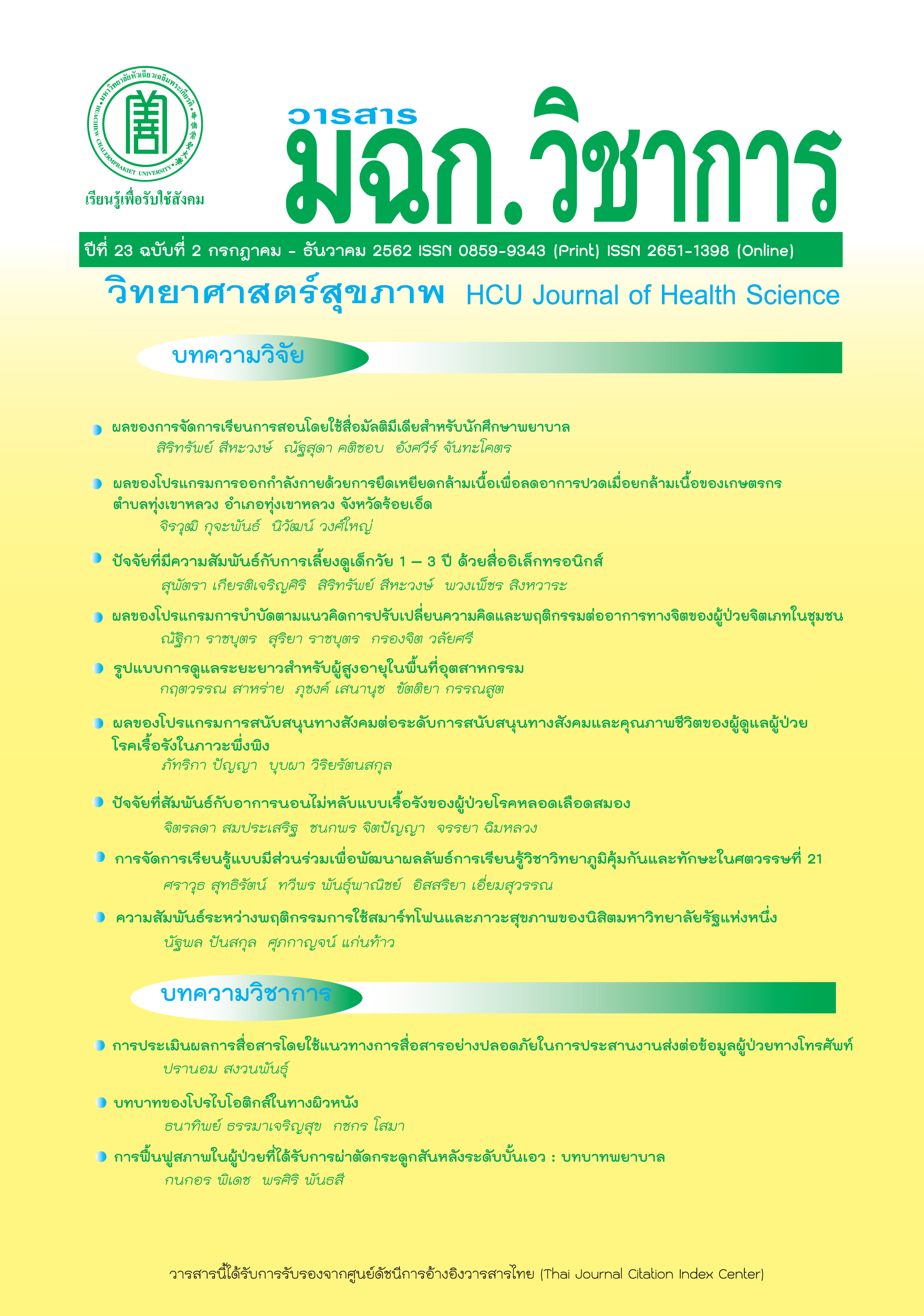Factor Related to Parenting Toddlers by Using Electronic Media
Keywords:
Electronic media, toddlers, parentingAbstract
This correlation descriptive research aimed to study the prevalence of parenting toddlers by using electronic media and to study factors related to parenting toddlers by using electronic media. The samples was randomized from 196 parents or guardians of toddlers at Ubon-Ratchathani province. The research instrument was a questionnaire of knowledge, attitude and practical in parenting toddlers by using electronic media. The data was analyzed by descriptive statistic and Pearson's product moment correlation coefficient.
The results showed that the prevalence of parenting toddlers by using electronic media was 62.24 percent and the most of all allowed toddlers to using electronic media up to 30 minutes in a day 33.70 percent Correlation analysis statistic revealed that there were no factors affecting to parenting toddlers by using electronic media.
Keywords : electronic media, toddlers, parenting toddlers
References
2. ราชวิทยาลัยกุมารแพทย์แห่งประเทศไทย สมาคมกุมารแพทย์แห่งประเทศไทย. คู่มือสำหรับพ่อแม่เพื่อเผยแพร่ความรู้ด้านการดูแลและพัฒนาเด็กตอนเด็กวัยอนุบาล 3-6 ปี [อินเทอร์เนต]. 2560[เข้าถึงเมื่อ 24 ตุลาคม 2561]. เข้าถึงจาก :http://www.thaipediatrics.org/Media/media-20171010123112.pdf
3. อภิรพี เศรษฐรักษ์ ตันเจริญวงศ์, ศรีรัฐ ภักดีรณชิต, ญาณวุฒิ เศวตธิติกุล. พฤติกรรมการใช้หน้าจอของเด็กไทยวัย 0 – 3 ปี ในเขตกรุงเทพมหานคร [อินเตอร์เนต]. 2560 [เข้าถึงเมื่อ 24 ธันวาคม 2561]. เข้าถึงจาก :http://ejournals.swu.ac.th/index.php/jcosci/article/download/11021/9137
4. กระทรวงสาธารณสุข. คู่มือเฝ้าระวังและส่งเสริมพัฒนาการเด็กปฐมวัย. เชียงใหม่: สยามพิมพ์นานาจำกัด; 2556.
5. วสันต์ ปฏิเสน. ทัศนคติของผู้ปกครองที่มีต่อศูนย์ส่งเสริมพัฒนาการเด็กในอำเภอเมืองเชียงใหม่ [การศึกษาอิสระ]เชียงใหม่ : มหาวิทยาลัยเชียงใหม่; 2553.
6. สำนักงานกองทุนสนับสนุนการสร้างเสริมสุขภาพ. ห่วงเด็กยุค 4.0 ดูทีวี เล่นแท็บเล็ตตั้งแต่ 1 ขวบ [อินเทอร์เน็ต]. 2560 [เข้าถึงเมื่อ 1 มิถุนายน 2561]. เข้าถึงจาก: http://www.thaihealth.or.th/Content/39489
7. Reid Chassiakos YL, Readesky J, Christakis D, Moreno MA, Cross C. Children and adolescents and digital media. Pediatrics. 2016;138
8. Cheung CHM, Bedford, R, De Urabain IRS, Karmiloff-Smith A ,Smith TJ.
Daily touchscreen use in infants and toddlers is associated with reduced sleep and delayed sleep onset. [internet]. April 18, 2016 [Cite 2018 Dec 30] Available from :https://www.nature.com/articles/srep46104.pdf .
9. Thompson AL, Adair LS, Bentley ME. Maternal characteristics and perception of temperament associated with infant TV exposure. Pediatrics. 2013;131
10. Lakes KD, Hoyt WT. Promoting self-regulation through school-based martial arts training. J Appl Dev Psycho. 2004;283-302.
11. วีระศักดิ์ ชลไชยะ. ผลของสื่ออิเล็กทรอนิกส์ผ่านจอต่อเด็กและวัยรุ่น. กรุงเทพมหานคร: บียอนด์ เอ็นเทอร์ไพร; 2560.
Downloads
Published
How to Cite
Issue
Section
License
บทความที่ได้รับการตีพิมพ์เป็นลิขสิทธิ์ของวารสาร มฉก.วิชาการ
ข้อความที่ปรากฏในบทความแต่ละเรื่องในวารสารวิชาการเล่มนี้เป็นความคิดเห็นส่วนตัวของผู้เขียนแต่ละท่านไม่เกี่ยวข้องกับมหาวิทยาลัยหัวเฉียวเฉลิมพระเกียรติ และคณาจารย์ท่านอื่นๆในมหาวิทยาลัยฯ แต่อย่างใด ความรับผิดชอบองค์ประกอบทั้งหมดของบทความแต่ละเรื่องเป็นของผู้เขียนแต่ละท่าน หากมีความผิดพลาดใดๆ ผู้เขียนแต่ละท่านจะรับผิดชอบบทความของตนเองแต่ผู้เดียว



